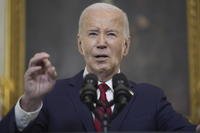The U.S. immediately protested the announcement Saturday that China was setting up an air umbrella over disputed islands in the East China Sea in what was seen as Beijing's latest challenge to the rebalance of U.S. forces to the Pacific.
Defense Secretary Chuck Hagel said that the U.S. was "deeply concerned" over China's surprise establishment of an Air Defense Identification Zone that would include the uninhabited Senkaku Islands, claimed by both Japan and China.
"We view this development as a destabilizing attempt to alter the status quo in the region," Hagel said. "This unilateral action increases the risk of misunderstanding and miscalculations [between U.S. and Chinese air and naval forces]."
China warned that all aircraft entering the Identification Zone must notify Chinese authorities first or risk being subject to "emergency military measures." China also said it would "identify, monitor, control and react" to any aircraft violating the zone.
Japan quickly sent the message that what appeared to be a Chinese power play would not be recognized.
In Tokyo, Junichi Ihara, head of the Foreign Ministry's Asian and Oceanian Affairs Bureau, told China's acting ambassador to Japan, Han Zhiqiang, that the zone is "totally unacceptable," according to a ministry statement.
Ihara also criticized China for one-sidedly setting up the zone and escalating bilateral tensions over the islands.
Both Beijing and Tokyo claim the islets, called Diaoyu in Chinese and Senkaku in Japanese. Protests erupted throughout China last year to denounce the Japanese government's purchase of the islands from private ownership, the Associated Press reported.
"This announcement by the People's Republic of China will not in any way change how the United States conducts military operations in the region," Hagel said. The U.S. continues to move military assets to Asia as the Defense Department works to develop closer relations with military allies in the region.
The U.S. has declined to take sides in the dispute between China and Japan over the islands' sovereignty while arguing for a peaceful solution under international law.
"This unilateral action constitutes an attempt to change the status quo in the East China Sea. Escalatory action will only increase tensions in the region and create risks of an incident," Secretary of State John Kerry said in a statement.





























